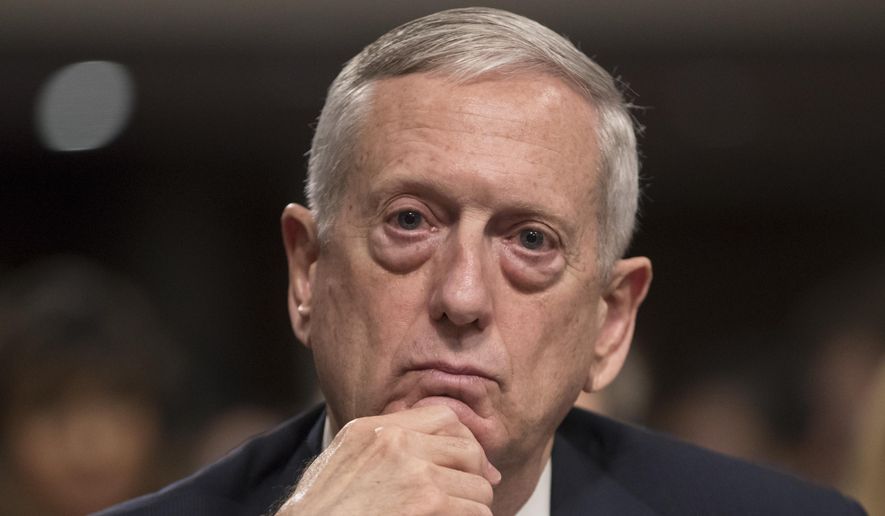The Pentagon on Monday pushed back against reports that an aggressive string of recent U.S. military sorties have killed hundreds of civilians in Iraq and Syria, even as a former senior-level Defense Department policy adviser said the Trump White House has unofficially “opened the aperture” for riskier strikes as part of a more aggressive campaign against the terror group.
Defense Secretary James Mattis reportedly has been weighing a loosening of restrictions on U.S. airstrikes that the Obama administration kept in place in war against the Islamic State in Iraq, current and former U.S. officials have said.
A key tenet of the proposed revised rules of engagement would raise the “acceptable” number of estimated collateral civilian casualties to authorize a U.S. or allied airstrike.
U.S. Central Command spokesman Col. John Thomas on Monday denied that the standing rules of engagement had changed in the fight against Islamic State and other jihadist groups in Iraq and Syria, insisting that all targets hit by American and coalition warplanes had been identified and vetted by local forces on the ground.
“There is no independent targeting” by U.S. or coalition pilots during airstrikes in Mosul or elsewhere he said, adding “there is no indication of … changing the way we operate” in support of local ground forces in both countries. Iraqi officials also rejected claims of large civilian deaths in recent attacks.
The U.S. and its allies acknowledged Friday they were investigating unconfirmed reports that up to 200 civilians may have died in recent American airstrikes in the current siege of the Iraqi city of Mosul. This comes after two incidents earlier this month in Syria in which high numbers of civilians were said to be killed in U.S. airstrikes.
A review of U.S. and coalition air operations by The Guardian newspaper found that coalition airstrikes jumped from just under 5,700 bombs dropped in November and December to roughly over 7,000 the following January and February. The U.S.-led coalition’s own statistics say there were 27 reports of incidents involving civilian casualties in Iraq and Syria in January, up from 12 in December. A majority of the incidents are still being assessed.
The uptick in violence over Mosul and around Islamic State’s self-styled capital of Raqqa in northern Syria is the result of “relaxed rules of engagement, hard urban fighting and an unimaginably brutal enemy,” said Hal Brands, the former Pentagon adviser who now teaches at Johns Hopkins University School of Advanced International Studies.
“The Trump team certainly has opened the aperture for airstrikes and other counter-terrorism missions and signaled a greater willingness to approve strikes that entail higher levels of risk, either to U.S. forces or to civilian population,” Mr. Brands said.
While U.S. military commanders still observe an “extremely strong ethic” to minimize non-combatant deaths, the grueling urban combat going on in Mosul and Raqqa include “the sort of missions in which civilian casualties can often be unavoidable.”
Secretary Mattis on Monday reiterated the conundrum facing U.S. commanders hitting Islamic State targets in densely populated and heavily fortified sites.
“We go out of our way to always do everything humanly possible to reduce the loss of life or injury among innocent people. The same cannot be said for our adversaries,” Mr. Mattis said before a meeting with Qatar’s Minister of State for Defense Affairs Dr. Khalid bin Mohammed al-Attiyah at the Pentagon.
Central Command officials are reviewing over 700 video feeds taken over the last 10 days, focusing on the area of western Mosul where local residents claim hundreds of Iraqi civilians had been killed during coalition airstrikes over the weekend.
Witnesses claim 137 Iraqi civilians perished during a single airstrike in the western Mosul neighborhood of Mosul al-Jadida. As of Sunday, 83 bodies had been pulled from the rubble near the location of the strike.
• Carlo Muñoz can be reached at cmunoz@washingtontimes.com.
• Guy Taylor can be reached at gtaylor@washingtontimes.com.




Please read our comment policy before commenting.